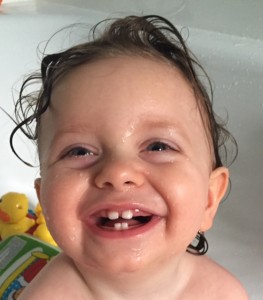Top Tips to Care for Your Baby’s Teeth
 Keeping your baby’s teeth healthy and introducing your child to good dental habits that are ingrained for life is vitally important. This guide gives parents all the key info you need at your fingertips.
Keeping your baby’s teeth healthy and introducing your child to good dental habits that are ingrained for life is vitally important. This guide gives parents all the key info you need at your fingertips.
When to Start Brushing Baby Teeth
Baby teeth tend to sprout out at around four to six months – as soon as the first one appears, it needs gentle brushing because plaque is a problem no matter what the age.
You might want to also softly clean your baby’s gums with a clean wet cloth after feedings. This gets them used to dental hygiene from the earliest age and creates the ideal clean environment for their new teeth to appear.
How to Brush Baby Teeth
Here are the steps that have been proven to work best:
- Buy an ultra soft toothbrush and fluoride toothpaste that’s designed for young children i.e. fluoride is necessary as it helps prevent tooth decay, but the typical brands used by adults are too strong for your little one. Check that the fluoride quota is at least 1,000ppm but no more than 1,350ppm.
- The easiest position is to sit your baby upright and facing away from as this allows more control when it comes to keeping their head still.
- Brush gently in small circular motions for about two minutes, with your main focus on where the gum meets the tooth. This should be done twice a day – in the morning and after their last feed before you put them to bed at night.
- When your child starts teething, be ultra gentle as their gums will be very sore.
A great tip is to brush your teeth in front of your baby as often as possible. Since children learn by copying, this will teach them to perceive brushing as a normal part of daily routine.
Tackling a Teething Baby
Teething generally starts occurring in babies at around six months. This means that they will be suffering from uncomfortably sore, red gums since their teeth will be pushing through for the first time. Some children start earlier – common signs of teething include swollen gums, increased chewing and dribbling, irritability and flushed cheeks.
Here are the best ways to help your little one through this trying time:
- Do your best to keep them distracted with fun activities.
- Be vigilant about wiping away excessive drooling or your baby will end up doubly irritated by stinging skin on their chin.
- Chilled teething rings are a great help as they sooth irritated gums.
- When you can see your baby is in pain, good solutions are to gently apply (sugar-free) teething gel directly to their gums to numb them, or as a last resort, give them a dose of (sugar-free) medicine designed for babies, such as Calpol or Nurofen for Children.
Why Dummies Are Best Avoided
Dummies were once a staple for babies and might seem like a good idea to help with teething problems, but we (and the British Dental Health Foundation are in agreement) advise against making dummies a habit. The reason for this is that dummies place pressure on your baby’s mouth and can cause their fledgling teeth to move out of alignment.
When to Bring Your Baby to the Dentist
We suggest you bring your baby along whenever you have an appointment, as this gets them familiar with the sounds and smells of a dental surgery. The first time to book your little one in for a baby dental check-up is usually around 18 months.
Conclusion
Being vigilant about caring for your baby’s teeth and gums from a very young age not only prevents problems developing as they grow bigger, it also ensures your child becomes used to good dental hygiene as an essential part of everyday life. If you’ve any questions about your baby’s teething issues or other dental problems, our trained staff at Woodcock Lane Dental Care are on hand to help.
Remember we are able to see children under the age of 18 and under 19 if still in full time education on the NHS.


Comments are closed.